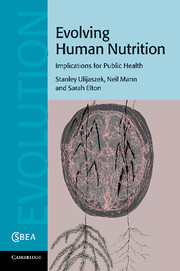Crossref Citations
This Book has been
cited by the following publications. This list is generated based on data provided by Crossref.
Ulijaszek, Stanley J.
2013.
What's in a Name? “Negritos” in the Context of the Human Prehistory of Southeast Asia.
Human Biology,
Vol. 85,
Issue. 1-3,
p.
495.
Crichton, Georgina
Elias, Merrill
Alkerwi, Ala’a
and
Buckley, Jonathon
2015.
Intake of Lutein-Rich Vegetables Is Associated with Higher Levels of Physical Activity.
Nutrients,
Vol. 7,
Issue. 9,
p.
8058.
Baltic, Milan Z.
and
Boskovic, Marija
2015.
When Man Met Meat: Meat in Human Nutrition from Ancient Times till Today.
Procedia Food Science,
Vol. 5,
Issue. ,
p.
6.
Hügel, Helmut M.
2015.
Natural Compounds as Therapeutic Agents for Amyloidogenic Diseases.
Vol. 863,
Issue. ,
p.
95.
Hügel, HelmutM
and
Jackson, Neale
2015.
Polyphenols for the prevention and treatment of dementia diseases.
Neural Regeneration Research,
Vol. 10,
Issue. 11,
p.
1756.
Ponnampalam, Eric N.
Lewandowski, Paul A.
Fahri, Fahri T.
Burnett, Viv F.
Dunshea, Frank R.
Plozza, Tim
and
Jacobs, Joe L.
2015.
Forms of n‐3 (ALA, C18:3n‐3 or DHA, C22:6n‐3) Fatty Acids Affect Carcass Yield, Blood Lipids, Muscle n‐3 Fatty Acids and Liver Gene Expression in Lambs.
Lipids,
Vol. 50,
Issue. 11,
p.
1133.
Franceschi, Claudio
Franceschi, Zelda Alice
Garagnani, Paolo
and
Giuliani, Cristina
2016.
Evolutionary Thinking in Medicine.
p.
259.
Ulijaszek, Stanley
and
Bryant, Eleanor
2016.
Evolutionary Thinking in Medicine.
p.
105.
Retamal, Rodrigo
and
Mascie‐Taylor, C. G. Nicholas
2018.
Regional variation in weight‐for‐height z‐scores and surface area/body mass ratio of Chilean children from birth to 3 years of age.
American Journal of Physical Anthropology,
Vol. 167,
Issue. 1,
p.
72.
Pentecost, Michelle
2018.
The Palgrave Handbook of Biology and Society.
p.
269.
Spence, Charles
2018.
Complexity on the Menu and in the Meal.
Foods,
Vol. 7,
Issue. 10,
p.
158.
Bejdová, Šárka
Dupej, Ján
Krajíček, Václav
Velemínská, Jana
and
Velemínský, Petr
2018.
Stability of upper face sexual dimorphism in central European populations (Czech Republic) during the modern age.
International Journal of Legal Medicine,
Vol. 132,
Issue. 1,
p.
321.
Ahmed, Aftab
Arshad, Muhammad Sajid
Imran, Ali
and
Ali, Shinawar Waseem
2018.
Meat Science and Nutrition.
Ulijaszek, Stanley
2018.
The International Encyclopedia of Anthropology.
p.
1.
Hamilton, Marcus J.
Buchanan, Briggs
and
Walker, Robert S.
2018.
SCALING THE SIZE, STRUCTURE, AND DYNAMICS OF RESIDENTIALLY MOBILE HUNTER-GATHERER CAMPS.
American Antiquity,
Vol. 83,
Issue. 4,
p.
701.
Sherry, Diana S.
2019.
Does knowledge of evolutionary biology change high school students’ attitudes about healthy eating?.
Evolution: Education and Outreach,
Vol. 12,
Issue. 1,
Schrader, Sarah
2019.
Activity, Diet and Social Practice.
p.
127.
Baker, Phillip
Machado, Priscila
Santos, Thiago
Sievert, Katherine
Backholer, Kathryn
Hadjikakou, Michalis
Russell, Cherie
Huse, Oliver
Bell, Colin
Scrinis, Gyorgy
Worsley, Anthony
Friel, Sharon
and
Lawrence, Mark
2020.
Ultra‐processed foods and the nutrition transition: Global, regional and national trends, food systems transformations and political economy drivers.
Obesity Reviews,
Vol. 21,
Issue. 12,
Leroy, Frédéric
Hite, Adele H.
and
Gregorini, Pablo
2020.
Livestock in Evolving Foodscapes and Thoughtscapes.
Frontiers in Sustainable Food Systems,
Vol. 4,
Issue. ,
Bejdová, Šárka
Dupej, Ján
Velemínský, Petr
Poláček, Lumír
and
Velemínská, Jana
2021.
Facial skeleton morphology: does it reflect social stratification in an Early Mediaeval population from Great Moravia (ninth–tenth century AD, Czech Republic)?.
Archaeological and Anthropological Sciences,
Vol. 13,
Issue. 3,



